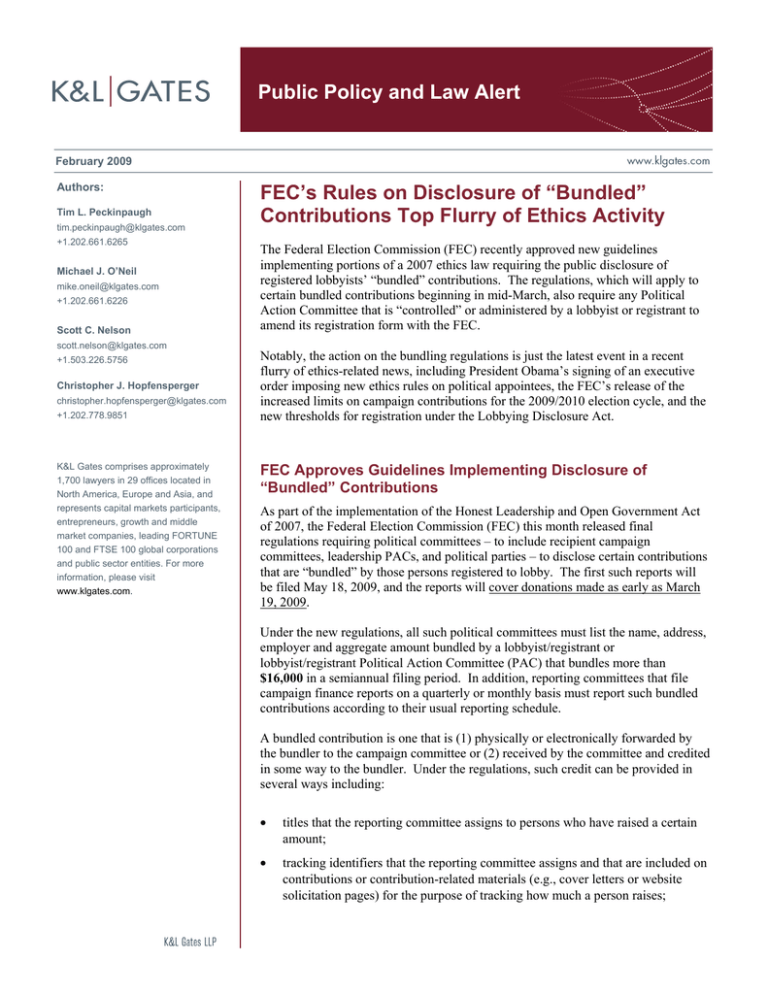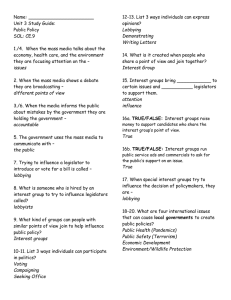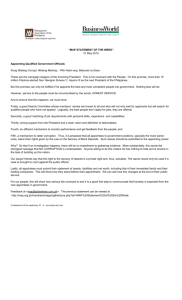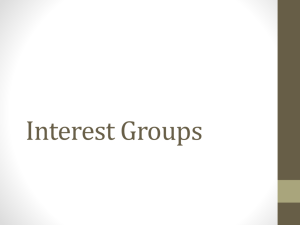
Public Policy and Law Alert
February 2009
Authors:
Tim L. Peckinpaugh
tim.peckinpaugh@klgates.com
+1.202.661.6265
Michael J. O’Neil
mike.oneil@klgates.com
+1.202.661.6226
Scott C. Nelson
scott.nelson@klgates.com
+1.503.226.5756
Christopher J. Hopfensperger
christopher.hopfensperger@klgates.com
+1.202.778.9851
K&L Gates comprises approximately
1,700 lawyers in 29 offices located in
North America, Europe and Asia, and
represents capital markets participants,
entrepreneurs, growth and middle
market companies, leading FORTUNE
100 and FTSE 100 global corporations
and public sector entities. For more
information, please visit
www.klgates.com.
FEC’s Rules on Disclosure of “Bundled”
Contributions Top Flurry of Ethics Activity
The Federal Election Commission (FEC) recently approved new guidelines
implementing portions of a 2007 ethics law requiring the public disclosure of
registered lobbyists’ “bundled” contributions. The regulations, which will apply to
certain bundled contributions beginning in mid-March, also require any Political
Action Committee that is “controlled” or administered by a lobbyist or registrant to
amend its registration form with the FEC.
Notably, the action on the bundling regulations is just the latest event in a recent
flurry of ethics-related news, including President Obama’s signing of an executive
order imposing new ethics rules on political appointees, the FEC’s release of the
increased limits on campaign contributions for the 2009/2010 election cycle, and the
new thresholds for registration under the Lobbying Disclosure Act.
FEC Approves Guidelines Implementing Disclosure of
“Bundled” Contributions
As part of the implementation of the Honest Leadership and Open Government Act
of 2007, the Federal Election Commission (FEC) this month released final
regulations requiring political committees – to include recipient campaign
committees, leadership PACs, and political parties – to disclose certain contributions
that are “bundled” by those persons registered to lobby. The first such reports will
be filed May 18, 2009, and the reports will cover donations made as early as March
19, 2009.
Under the new regulations, all such political committees must list the name, address,
employer and aggregate amount bundled by a lobbyist/registrant or
lobbyist/registrant Political Action Committee (PAC) that bundles more than
$16,000 in a semiannual filing period. In addition, reporting committees that file
campaign finance reports on a quarterly or monthly basis must report such bundled
contributions according to their usual reporting schedule.
A bundled contribution is one that is (1) physically or electronically forwarded by
the bundler to the campaign committee or (2) received by the committee and credited
in some way to the bundler. Under the regulations, such credit can be provided in
several ways including:
•
titles that the reporting committee assigns to persons who have raised a certain
amount;
•
tracking identifiers that the reporting committee assigns and that are included on
contributions or contribution-related materials (e.g., cover letters or website
solicitation pages) for the purpose of tracking how much a person raises;
Public Policy and Law Alert
•
access (including offers of attendance) to events
or activities given to the bundler; and
•
mementos (e.g., photographs with the candidate
or books autographed by the candidate) given to
the bundler.
This list of designations and the means of
recognition that will trigger the disclosure
requirement is not exhaustive, and the FEC
expressed its intention to adopt an expansive view of
such matters. The Commission did note, though,
that the definition of recognition does not extend to
the mere knowledge of a registrant’s bundling
activities.
Finally, PACs that are “controlled” by a lobbyist or
entity registered under the Lobbying Disclosure Act
(LDA) must amend their FEC Form 1 by March 29,
2009.
Pre-employment restrictions: All such appointees
are now prohibited from working on any “particular
matter involving specific parties that is directly and
substantially related to [a] former employer or
former clients” for the first two years they hold their
positions. Those who were registered lobbyists
prior to appointment have further restrictions,
including that they may not seek employment with
any agency that they lobbied within the two years
prior to their appointment or participate in any
specific issue area in which they lobbied in the two
years prior to their employment.
The post-employment restrictions also have been
increased. All appointees are subject to a two-year
ban on lobbying their former agencies in certain
situations (as opposed to the existing one year ban).
Those who leave the administration to lobby are
banned for the duration of the administration from
lobbying covered executive branch officials and
non-career SES employees.
For a more detailed analysis of the new bundling
regulations, including examples of their application,
please consult the updated K&L Gates Ethics Guide
by clicking here.
Finally, appointees also are subject to additional gift
ban rules on gifts from lobbyists and those who
employ them. This apparently means that gifts from
those who retain outside lobbyists but do not
themselves file LDA reports are not included in the
new restrictions.
President Obama Imposes New Ethics
Restrictions on Political Appointees
As a baseline matter, the executive order reduces
the number of exceptions to the definition of “gift”
that apply to registrants. The exceptions that
continue to apply to registrants are:
Shortly after his inauguration, President Obama
issued an executive order further limiting the preand post-employment activities of appointees in his
administration and also further limiting gifts from
lobbyists and those who employ them to those same
appointees.
The appointees to which the new restrictions apply
include:
•
non-career, full-time Presidential and Vice
Presidential appointees;
•
non-career Senior Executive appointees; and
•
Schedule C appointees or appointees selected
under similar criteria.
•
gifts based on a personal friendship
•
discounts and similar benefits
•
gifts that are based on an outside business or
employment relationship that:
o
stem from the business or employment
activities of an employee’s spouse when it
is clear that such benefits have not been
offered or enhanced because of the
employee’s official position, or
o
are ordinarily provided by a prospective
employer in connection with bona fide
employment discussions
February 2009
2
Public Policy and Law Alert
•
gifts, including those of protocol or etiquette,
given to the president or vice president and
related to the conduct of their offices
•
gifts allowed under specific statutory authority
As a result of the new rules, however, registrants are
no longer allowed to provide gifts to covered
executive officials under the following previous
exceptions:
•
widely attended events
•
items valued at less than $20 per occasion and
totaling less than $50 in a calendar year
•
social invitations from persons other than
prohibited sources
•
meals, refreshments and entertainment in
foreign areas
•
awards and honorary degrees
•
gifts that are based on an outside business or
employment relationship that result from outside
business or employment
•
gifts connected with political activities
permitted under the Hatch Act
FEC Raises Contribution Limits
The FEC also recently increased the limits on
individual political contributions, raising the amount
that an individual can give to a candidate to $2,400
per election. Under the new limits, individuals may
also donate up to $30,400 per year to national parties
and a combined total of $115,500 for the 2010 races
to all federal candidates, parties and committees.
The increases, which are instituted every two years,
are required by the Bipartisan Campaign Reform
Act of 2002, which indexes the limits for inflation.
The amount individuals can give to Political Action
Committees remains at $5,000 per year.
For a chart detailing the full range of applicable
contribution limits, click here.
Thresholds for Lobbying Registration
Increase to Adjust for Inflation
Under the terms of the LDA, the threshold levels for
lobbying expenses that trigger the law’s registration
requirement reset on January 1, 2009. Persons
whose lobbying expenses are below these levels
may be excluded from registering.
For retained “outside lobbyists,” registration on
behalf of a particular client is not required if the
total income from the client for lobbying activities
does not exceed, or is not expected to exceed,
$3,000 during any quarterly period.
For organizations having in-house lobbying
operations, registration is not required, unless
lobbying expenses exceed, or are expected to
exceed, $11,500 during any quarterly period.
These amounts are indexed for inflation and will
increase again in early 2013. For more information
on whether your expenses require you to register
under the LDA, click here.
K&L Gates comprises multiple affiliated partnerships: a limited liability partnership with the full name K&L Gates LLP qualified in Delaware and
maintaining offices throughout the U.S., in Berlin and Frankfurt, Germany, in Beijing (K&L Gates LLP Beijing Representative Office), and in
Shanghai (K&L Gates LLP Shanghai Representative Office); a limited liability partnership (also named K&L Gates LLP) incorporated in England and
maintaining our London and Paris offices; a Taiwan general partnership (K&L Gates) which practices from our Taipei office; and a Hong Kong
general partnership (K&L Gates, Solicitors) which practices from our Hong Kong office. K&L Gates maintains appropriate registrations in the
jurisdictions in which its offices are located. A list of the partners in each entity is available for inspection at any K&L Gates office.
This publication is for informational purposes and does not contain or convey legal advice. The information herein should not be used or relied upon
in regard to any particular facts or circumstances without first consulting a lawyer.
©2009 K&L Gates LLP. All Rights Reserved.
February 2009
3







